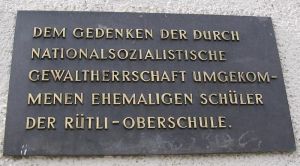 Photo by Lienhard Schulz / WIkimedia Commons. Read about the Rütli School in Berlin.
Photo by Lienhard Schulz / WIkimedia Commons. Read about the Rütli School in Berlin.
A couple of days ago Esko Kilpi wrote about emergence and self-organization with references to the Wired’s article The GitHub Generation: We’re All in Open Source Now and Sugata Mitra’s latest TED talk Build a School in the Cloud.
I started to think how would be a school that is primary operating according to the principles of free and open source software development communities. I didn’t think about online schools or even the possibility to extend some of the school operations to the “cloud”. I was thinking more school as we know it today: a place, most often a building, where people come to learn. I made a list.
(1) Free project spaces. The free and open source school must have a lot of free project space for anyone to take in use for any project they are interested in to work on. The space should have basic materials (pens, colors, paper, cardboard, partition walls, whiteboards, laptops etc.) for people to define spaces, to write, to draw, to hang up things, to save things etc. (You may compare this to all the online services we have to host open source code, mailing lists to communicate, GitHub etc.)
(2) Freedom to start and join projects. In these spaces any member of the school is free to start a study project and invite in it who ever they want to invite. The spaces are open so that people can see what other people are doing and anyone may join them for a short or a longer period of time. This is the case with visitors, too. Doors are open for people to come and see what’s going on and to join a project if they wish. Joining a project is the only way to become a member of the school.
(3) The school is a copyright / IP free zone. Anything seen in the project spaces can be copied to another project. In the school people may show whatever media for each other for whatever purpose without any copyright restrictions.
(4) Progressive inquiry. The purpose of the school is to help people to learn on things they are interested in to study and learn about. The progressive inquiry, relying on scientific method and critical thinking method, is the primary approach in the study work. The aim is to deepen everyone’s understanding on the things under study and also contribute to the commons.
(5) Flat organization. Students are free to study whatever they want, but because we know that sometime students may need advice to find topics that are truly meaningful, interesting and important there are two roles in the school: students and mentors. To become a mentor is a matter of merits. Mentors select mentors.
(6) Civic virtue, transparency and leadership. Civic virtue is expected from all the members of the school. The primary decisions making method is consensus. Decisions are expected to be based on on sense making after having all possible data in hand and listening of different point-of-views. If some people do not agree with the decisions they are free to forge the School by starting their own School. There is a leader.
Simple. Why we are not doing this? Or are we?
6 replies on “The Principles of a Free and Open Source School”
Thank you for a great article. As a comment to point five: I believe that students and mentors are not two separate, different groups. Everybody should have a dual role in the future.
Esko
LikeLike
Thank you for a great article. As a comment to point five: I believe that students and mentors are not two separate, different groups. Everybody should have a dual role in the future.
Esko
LikeLike
Esko. I fully agree with you.
When making a difference between students and mentors I wanted to point out that open source development communities also have hierarchy. Some members of the projects are more experiences and commendable than others and therefore have more power in the community e.g. right to commit changes.
Still everyone in the community is same time a mentor and a student.
LikeLike
Esko. I fully agree with you.
When making a difference between students and mentors I wanted to point out that open source development communities also have hierarchy. Some members of the projects are more experiences and commendable than others and therefore have more power in the community e.g. right to commit changes.
Still everyone in the community is same time a mentor and a student.
LikeLike
Sounds a lot like you are hoping to re-invent adult study centres (opintokeskukset) or trying to bring them to this century?
Open source is as good of an ideology as political ideas were in the old days, when most of the study centres were first established.
LikeLike
Sounds a lot like you are hoping to re-invent adult study centres (opintokeskukset) or trying to bring them to this century?
Open source is as good of an ideology as political ideas were in the old days, when most of the study centres were first established.
LikeLike